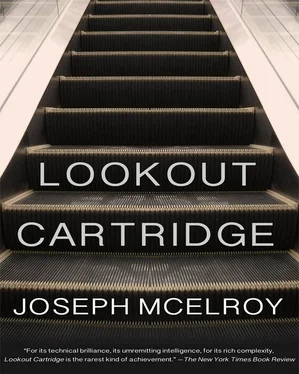Joseph McElroy - Lookout Cartridge
Здесь есть возможность читать онлайн «Joseph McElroy - Lookout Cartridge» весь текст электронной книги совершенно бесплатно (целиком полную версию без сокращений). В некоторых случаях можно слушать аудио, скачать через торрент в формате fb2 и присутствует краткое содержание. Год выпуска: 2014, ISBN: 2014, Издательство: Dzanc Books, Жанр: Современная проза, на английском языке. Описание произведения, (предисловие) а так же отзывы посетителей доступны на портале библиотеки ЛибКат.
- Название:Lookout Cartridge
- Автор:
- Издательство:Dzanc Books
- Жанр:
- Год:2014
- ISBN:9781941088036
- Рейтинг книги:3 / 5. Голосов: 1
-
Избранное:Добавить в избранное
- Отзывы:
-
Ваша оценка:
- 60
- 1
- 2
- 3
- 4
- 5
Lookout Cartridge: краткое содержание, описание и аннотация
Предлагаем к чтению аннотацию, описание, краткое содержание или предисловие (зависит от того, что написал сам автор книги «Lookout Cartridge»). Если вы не нашли необходимую информацию о книге — напишите в комментариях, мы постараемся отыскать её.
Lookout Cartridge — читать онлайн бесплатно полную книгу (весь текст) целиком
Ниже представлен текст книги, разбитый по страницам. Система сохранения места последней прочитанной страницы, позволяет с удобством читать онлайн бесплатно книгу «Lookout Cartridge», без необходимости каждый раз заново искать на чём Вы остановились. Поставьте закладку, и сможете в любой момент перейти на страницу, на которой закончили чтение.
Интервал:
Закладка:
Or your wife says to some visiting American who’s asked if she’d like to go back to the States, By now it’s six of one, half a dozen of the other, but it would be a change — though you think that when she looks over at you she remembers you inside her, recalls looking forward and backward to it, looks forward to it. (Why are English not called expatriate when they settle in the States?)
Or you say to your friend Dagger, We’ll make a film, and you tell him what’s on your mind. But later the film seems not yours, not his either, but just to have happened — and it’s not what you dreamed of, but it’s something.
You get an inkling one day that the ruination of the film was something someone decidedly reached out to effect: and you get on a plane to New York, leaving behind an encounter with your seventeen-year-old daughter and looking ahead beyond the East where you’ll be to a California she says she is settled on going to perhaps even before she takes her A-levels.
But you were coming anyway on business, and the last time you made love to Lorna it rose through your head in clear blue-green bubbles of smiling sound that that amateur film had not after all been necessary.
But life is not so disappointing as such passages of consolation seem to conceal. You’ve spent forty-eight hours in New York and someone is coming to you wanting to know what you have, though who is hand in glove with whom is hard to say. You haven’t picked up those Wall Street brochures for your son or was it a book about the market — then over your cheeseburger you saw Will hadn’t made it clear, maybe was just giving you something to do. Your frothy vanilla malted flowed down and was gone — such a malted.
You haven’t had your cigarette today.
Monty Graf waited and now broke his lips to speak but I was in ahead of him: There are two films really, what my friend Dagger DiGorro wanted and what I wanted. He’s good on the hardware. I mean, he never made a serious film but when we shot the naval engagement in Corsica in slow motion he knew it wasn’t just a matter of turning the frame knob up to 64, there was the little power switch below and the ASA gauge above.
Could I have heard about him on the grapevine? said Monty Graf.
I turned to wave at a waiter and look the man in glasses in the corner of his profiled eye. He was the one who’d made me a cup of tea all right.
The idea was this, I began. But I couldn’t mention Claire. Graf must be the Monty that Claire was talking to on the phone, for she’d already mentioned Monty Graf to me. I had slipped into other circuits, and Graf must know Aut too if Jan Graf was any relation, but if he knew Claire he must at least know of Aut; but Graf would not know Dagger, for Dagger would have mentioned him — still, through Claire Dagger must have become known to Graf, though what Claire could have told Monty Graf remained to be seen and Claire knew only what Dagger had told her plus my bait yesterday; but if Jan Graf was a relation, did Monty therefore know the Indian who worked in the Knightsbridge gallery, or even Cosmo? But that kid in the loft Jerry might know Claire, the way he said You never met her to the man in glasses.
So to be at least myself, I decided to tell Monty Graf what the idea had been and still in some form was. Graf widened his eyes as I said Bluefish to the waiter, who raised his eyebrows when I said beets or carrots instead of french fries, and as he was going away I said light beer.
For example, said Monty Graf, the footage that survived the fire, why a rush of that? Was that the beginning of the film and you wanted to see how you were doing? You shot that in London? Someplace else, I forget.
You didn’t forget, I said, you were never told.
The waiter brought a coffee-colored dark beer with a thick head like rusty marshmallow. I pointed to my companion’s milky champagne glass and the waiter said Right, and went away.
No, I said to Graf, it wasn’t the beginning. I’ll tell you about the beginning; we never did see it printed; but this is what happened.
I did not describe my effort to get Chaplin to let us film an interview with him and it would have been too hard to explain to Graf what I’d had in mind vainly urging Dagger to shoot a hundred frames or so of a letter lying, say, on Dagger’s worktable that I in fact wrote to Chaplin.
No, I said, the beginning would have been a bare room and the only things on the film besides a couple of straight chairs and a vivid blue-red-and-umber Turkish floor cushion were the two guys we were shooting, plus whatever Dagger got of me with the mike: just a quick cut, then back to the faces.
We told them to go ahead, maybe not mention England, just say for example “here,” so the room as I conceived it with plain plaster walls that we’d depictured would be just an unplaced room. Dagger went along with this.
Who were they? said Graf.
One’s an American corporal from Heidelberg, skipped to Sweden, later crossed into Norway, stopped off with his sister’s girlfriend who’s teaching at an English Institute in Trondheim. Well, then he shipped on some American’s yacht looking for sanctuary perhaps and wound up in the Faeroe Islands between Iceland and the Shetlands and waited while his employer, a dilettante geologist, fished for trout. But our deserter apparently couldn’t wait. He made it to the Hebrides with a fisherman and there I happen to know he lived in a hut near Mount Clisham.
The other? said Monty Graf.
Friend of the first, according to Dagger.
How did Dagger know? said Graf.
Most of what I told Graf was in a desk drawer in Highgate. Earlier today London time Lorna rested her arm on that desk writing a check for her yoga class and would look up with that blank eye when Jenny came in the living room having descended from her own desk upstairs where she might well have been studying A-level Latin. And being asked by Lorna how it had been going, Jenny tossed her head and blew hair out of her eyes which comes right back down again over her cheek like Claire’s.
Does Jenny stay in the living room with Lorna or cross to the kitchen or go back upstairs to Will’s room to borrow a quid if he’s home, or go back to her room? Or go across the road to the new Americans she’s friendly with who she says are so interested in her? It’s suppertime. But why then is Lorna sitting at the desk?
I’ve been hard on Claire, maybe she was serious about throwing up her job and moving to England.
Graf sipped, then spoke with patient elocution. An unplaced room and you took the pictures down before you shot the scene. And a blue, red, and umber Turkish floor cushion. What did they talk about?
In my ear my voice seemed loud, though I kept hitting on the idea that Graf didn’t exactly hear me, but this was perhaps his New York eye, not me.
The film’s aim, I said, was a sort of power.
Over who?
No. Power shown being acquired from sources where it had momentum but not clarity.
What does that mean, said Graf.
Preying on power. Saving power from itself.
Did it have a story? said Graf.
For me it had. For Dagger I don’t know. For him it was a documentary, he said, and he said it would come clear in the end, which was what I thought myself but from my angle.
Political power, said Graf, returning to my other remark. He was looking into his glass, an ice cube had a fog of milk over it.
Any power in the right sequence, I said.
The fire now, said Monty Graf.
Power with momentum but not clarity, I said. The fire? Imagine filming that, filming the dissolution of the film, the burning, filming the burning of even the raw stock running through your own gate, the fire from Dagger’s table leaning out toward the camera you’ve got running in your hand.
Читать дальшеИнтервал:
Закладка:
Похожие книги на «Lookout Cartridge»
Представляем Вашему вниманию похожие книги на «Lookout Cartridge» списком для выбора. Мы отобрали схожую по названию и смыслу литературу в надежде предоставить читателям больше вариантов отыскать новые, интересные, ещё непрочитанные произведения.
Обсуждение, отзывы о книге «Lookout Cartridge» и просто собственные мнения читателей. Оставьте ваши комментарии, напишите, что Вы думаете о произведении, его смысле или главных героях. Укажите что конкретно понравилось, а что нет, и почему Вы так считаете.












